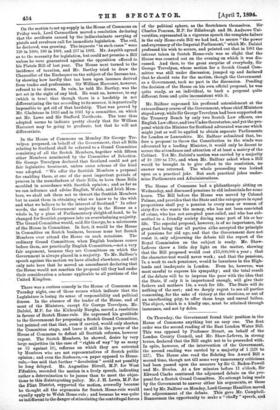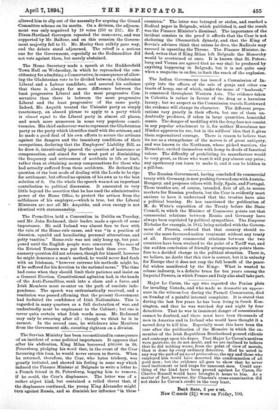On Thursday, the Government found their position in the House
of Commons anything but an easy one. The first. order was the second reading of the East London Water Bill. This was opposed by Professor Stuart, on behalf of the London County Council, and Mr. Shaw-Lefevre, in strong terms, declared that the Bill ought not to be proceeded with. In spite, however, of the intervention of the Government, the second reading was carried by a majority of 1 (228 to 227). The House also read the Behring Sea Award Bill a. second time, though not till some very unnecessary criticisms had been passed upon the measure by Sir G. Baden-Powell and Mr. Bowles. At a few minutes before 11 o'clock, Sir Edward Clarke continued the adjourned debate on the pro- posal for a Scotch Grand Committee. No attempt being made by the Government to answer either his arguments, or those used by Mr. Balfour on Monday, Lord George Hamilton moved the adjournment of the debate. This gave Mr. Campbell. Bannerman the opportunity to make a " chaffy " speech, and allowed him to slip out of the necessity for arguing the Grand Committee scheme on its merits. On a division, the adjourn- ment was only negatived by 18 votes (250 to 232). Sir F. _Dixon-Hartland thereupon repeated the manceuvre, and was :supported by Mr. Balfour, and on this occasion the Govern- ment majority fell to 15. Mr. Morley then sulkily gave way, and the debate stood adjourned. The rebuff is a serious -one for the Government, especially as the Redmondites did not vote against them, but merely abstained.







































 Previous page
Previous page